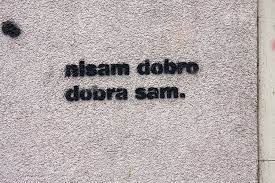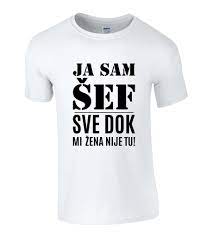Making mistakes is a natural part of learning Croatian and they are only bad if you allow them to be – and if you don't learn by them. It doesn't matter if your vocabulary is limited. It doesn't matter if your pronunciation isn't flawless. And it certainly doesn't matter if your grammar isn't perfect. Everyone – even native speakers make mistakes.
As difficult and frustrating as the experience may be, it’s no reason to become discouraged about learning Croatian! The more you use it, the easier it becomes.
1. Pisati vs. pišati
Pisati – to write
Pišati – to pee
The devil is in the detail, we all know that. A tiny diacritic above the letter can change the course of a conversation. It’s very different if, at a business meeting, you want to say “I have to go home, I have to write a report” and you end up saying “I have to go home, I have to pee a report.”
In Croatian, it’s very easy to confuse the two: Moram pisati vs Moram pišati.
2. Ti ili Vi?
Croatian has a formal and an informal way of addressing people and they define your relationship with the people you are speaking to, the formal Vi (You, sir, for example), and the informal Ti (You, talking to a sibling, friend, etc.), much like French (Vous vs. tu), for example. There are people who will get upset if you address them informally, using ti. What about your mother-in-law? Ti or Vi?

3. Gender
Kako si?, Croats will ask you a million times a day. It’s not the same if you reply
Ja sam dobar and Ja sam dobro. (I am good (singular, male) vs. I am well).
I know you’re a good person, but I want to know if you’re well.
4. Me, myself and I
It sounds unbelievable for a nation that likes talking about itself and its failures all the time, but we avoid using the word “ja” (I) whenever possible.
You won’t sound Croatian if you say: Ja sam jučer išao u dućan jer sam ja morao kupiti….
(I had to go to the shop yesterday because I had to buy…)
The only time we actually have to use "ja" is when introducing ourselves and stating our profession/nationality.
Croatian verbs do not require a subject, so when in doubt, be modest, and don’t use “ja” (I).
5. Ideš li sa mnom u kino?
kino – cinema
Kina – China

If you ask your girlfriend “Ideš li sa mnom u kino?” it’s not the same as asking “Ideš li sa mnom u Kinu?” because the first case means you want to take her to the cinema, and the second that you’re suggesting a trip to China.
6. Accent
I know you’re excited that you’re speaking hrvAtski and accent might not be the most important thing to you.
But, the word hrvatski is not pronounced hrvATski, but hRvatski. I know, you still hear CNN reporters saying that they’re live from saraJEvo or dubROvnik, but if you want to sound Croatian, forget about CNN and say SArajevo and DUbrovnik.

7. The famous Croatian "je"
"It’s sunny", or "Je sunčano", right? Wrong.
Sunčano je. (It's sunny)
“Je” simply cannot be at the beginning of a Croatian sentence.
Je li tako? (Is that right?) – Je tako! / Right it is.
Ooops, sorry, tako je! (That’s right).

8. He never doesn’t do nothing around the house!
On nikad ništa ne radi kod kuće! – every average Croatian wife will complain about her husband. Is he really that lazy that she had to use triple negation?
Ja nikad ne spavam / I never don’t sleep.
Ja nikad ne idem u kino / I never don’t go to the cinema.
Don’t even try to figure this one with double negatives out. Just deal with it. And never question this rule!


9. Aaaaaa! The problem of the disappearing A
I am going to Zadar. Idem u Zadar. Right? Right.
I am from Zadar. Ja sam iz Zadara. Right? Wrong. Ja sam iz Zadra.
Where did the second A disappear? Don't ask. Nobody knows.



Comentarios